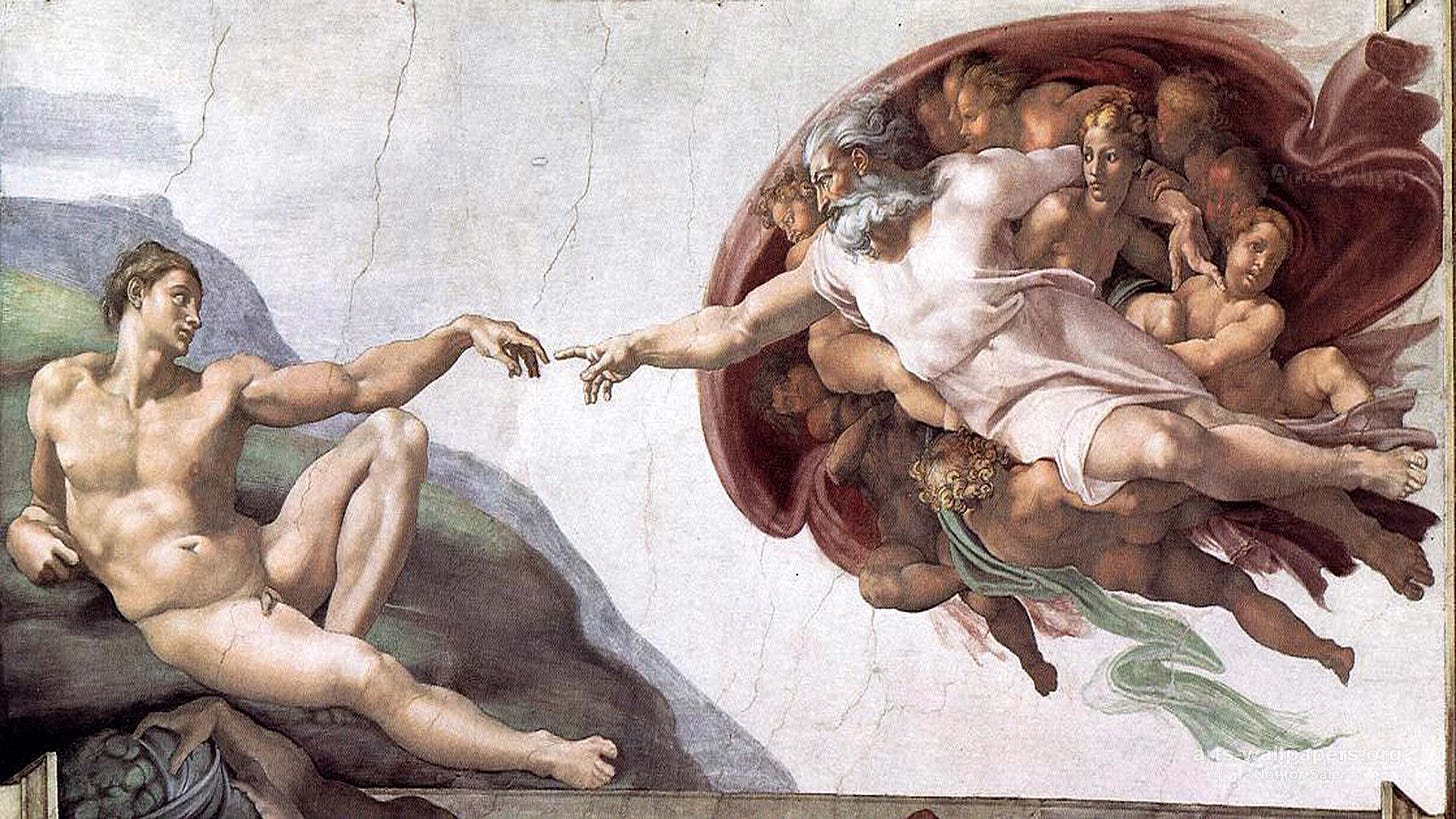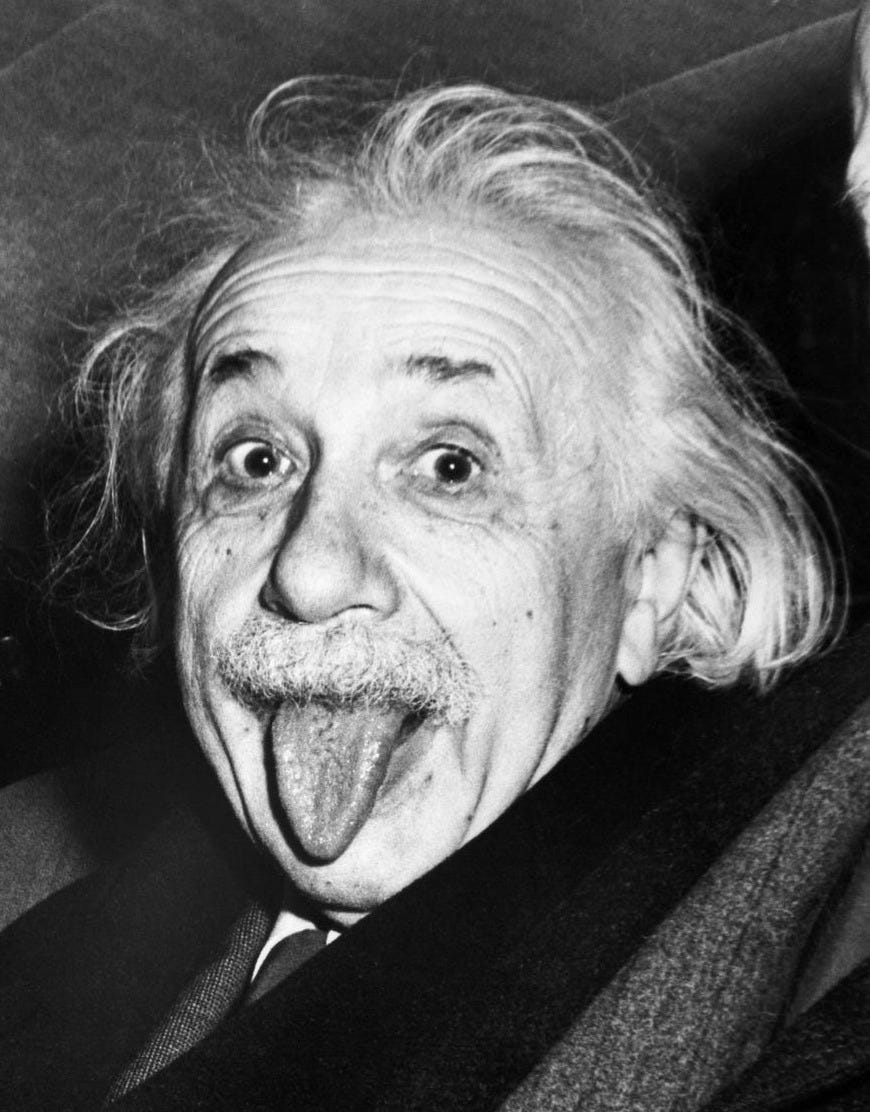The Notorious G.O.D.
Plus, A Visit from Alex J. O'Connor, AKA, The Cosmic Skeptic
Soul Boom Greetings to All!
Whether you’re a skeptic, seeker, believer, doubter—or perhaps somewhere in between—this week’s Soul Boom podcast is for you.
Rainn Wilson sits down with Alex J. O’Connor, also known as Cosmic Skeptic, to talk about belief, skepticism, and the rich and nuanced intersection of spirituality, religion, and reason.
Their discussion is open, honest, and challenging in all the best ways, yet it ventures into the ineffable—the realm where words and ideas can only take us so far. As Rainn often quotes from Buddhist wisdom: 'A finger pointing to the moon is not the moon.' Even so, the two manage to spelunk into those depths. What makes this conversation truly special is their mutual curiosity and openness, as they navigate the tricky terrain of faith and reason without any need to 'win' the debate.
As both Rainn and Alex see it, society today is grappling with a cultural void—having tossed the spiritual baby out with the religious bathwater (or should we call it holy water?). That is to say, we modern humans aren’t quite sure what to do with ourselves. We witness a deep yearning for connection, meaning, and purpose. This is where Soul Boom comes in. There’s no agenda here to convert anyone to a particular ideology or belief system. Instead, we’re exploring the vast terrain of religion and spirituality with one central question in mind: How can we apply spiritual tools to daily life? And beyond that—can these tools help us build a better, more just, and compassionate society?
In the spirit of this conversation, we thought it fitting to share an excerpt from the Notorious G.O.D. chapter of the Soul Boom book. For those who, like Alex, find themselves critical of traditional religious frameworks—but still find value in the big questions they pose—this excerpt offers a fresh perspective on spirituality. It’s one that invites us to wrestle with the mysteries of existence rather than reject them outright.
Enjoy the excerpt, and let us know in the comments: What does the Great Mystery mean to you?
With open hands,
The Soul Boom Team
The Notorious G.O.D.
Excerpted and adapted from Soul Boom: Why We Need A Spiritual Revolution by Rainn Wilson

Yo, Atheists!
In case you were wondering, this is not going to be like one of those YouTube videos where a God-believer and an atheist sit on a stage in front of a partisan audience (who already have their minds made up) and have an argument about whether God exists or not. Those discussions are pointless. Just read the comments sections underneath the videos. No one has ever changed their mind about something as colossal as the Supreme Being because of who scored more points in an argument on YouTube, no matter how articulate the speakers might be.
I’m not here to change anybody’s mind. Just to provide some (hopefully) interesting, fresh perspectives. I absolutely love, admire, and respect atheists. Seriously. If I wasn’t a dyed-in-the-wool theist, I would definitely go back to being an atheist.
Why? Because atheists, by and large, love science and its method of understanding the universe. And I can totally relate because I love science too. I certainly don’t consider science to be in any kind of opposition to faith and spirituality. That’s the epitome of a false dichotomy. Both are effective, albeit different, modalities for understanding the same ultimate reality.
Science is an incredible methodology and set of tools for studying the material world. Through its systematic focus, it has unlocked, especially over the past two centuries, what one could consider miracles. The quality of our lives has been made infinitely better thanks to it. (He says, drafting this book on his laptop, on which he can watch videos of cats playing the piano, calculate advanced math equations, research anything that has ever existed ever, record music tracks, schedule his calendar down to the minute, listen to podcasts about beekeepers, and talk face-to-face in crystalline clarity with someone in Mongolia.)
Science. I mean, who doesn’t love the systematic study of the structure and behavior of the physical and natural world through observation and experimentation!
Unfortunately, throughout the ages science has frequently been positioned as being in opposition to faith. If one looks at a thumbnail history of God, He (God) was an ever-present figure with us Homo sapiens, appearing in various incarnations, both pantheistic and monotheistic, since the dawn of humanity. Every Homo sapiens culture has some kind of relationship with a divine power that exists beyond space and time—a relationship that many believe helped early civilizations answer questions about the world that couldn’t be answered in any other way. This, historically, is called the “god of the gaps.” Anything science can’t explain is God or is of God.
We early humans don’t know where that scary-sounding thunder comes from? Well, let’s put a divine face or label on it and, by creating a god of thunder, like Thor (Norse) or Ba’al (Phoenician) or Set (Egyptian), BOOM! Problem solved. (See what I did there?) The answer to the mysterious noise must be that there’s a powerful being in the sky that occasionally gets angry and makes a thunder crash with his hammer or sword or what have you. Then, eventually, through the tools of science we humans discover that thunder comes from the rapid expansion of the air surrounding the path of electricity discharged through a lightning bolt, and all of a sudden, there’s no longer any need for Thor or Ba’al or Set. The powerful “god” is then relegated to colorful ancient mythology, and science holds the new explanation for said phenomenon.
Some religious folk would continue to draw this “god of the gaps” idea forward to the modern day and say (using the example of some event we don’t have an explanation for as of yet), “Well, since we don’t have a clue how life started on planet Earth, or how a bunch of chemicals and molecules suddenly transformed into single-celled organisms and bacteria, their de facto creation must be God’s finger zapping the oceans of our planet billions of years ago!”
However, to the materialist / naturalist / person of science, everything can ultimately be explained by a scientific theory. So it’s not that we don’t know the answer to why chemicals and molecules evolved into live organisms four billion years ago . . . we simply don’t know the answer yet.
Now of course this whole paradigm is ridiculous. It pits religion versus science in an incredibly simplistic way. Everything proven belongs to science and all things mysterious and undiscovered belong to God? Um, no. God is either within and without and interwoven throughout all of nature and natural phenomenon, or there is no supernatural presence whatsoever and there is only matter, energy, and their physical laws bobbing and throbbing about purposelessly in a vast, empty space.
Again, it’s impossible to stereotype an entire population based on what they believe, but on the whole, I think it’s safe to say that atheists are naturally skeptical. As a whole, they try not to inherit beliefs handed down from their childhood, culture, media, or family. They pride themselves on examining things with an eye on the individual investigation of truth and demand to be shown proof, usually repeatable and provable. Those admirable, sometimes pesky, atheists delight in knocking down sacred shibboleths, challenging all assumptions about the supernatural. They reason things out on their own, with their own eyes, their own brains. I greatly admire these traits and attempt to hold myself to the same exacting, skeptical standard. We all should.
In fact, I would say that if you blindly and incuriously believe in any religious faith, especially the faith of your parents, you are kind of an idiot. There, I said it.
Atheists have rejected so many of the obvious hypocrisies, corruptions, and especially nonsensically literal interpretations of symbols and metaphors in most of the world’s religions. At tremendous risk of pissing off every single religious faith in the world, I would simply offer you some examples of these superstitions:
Elephant-shaped gods
The reincarnation of “bad” human beings into cockroaches
People being turned willy-nilly into pillars of salt
Magical enlightenment under trees
Burning bushes that talk to you
Jesus’s body floating away after three days to be with his dad
Mohammed riding a winged horse back and forth to Jerusalem in a night
Besides all the mythological stories, atheists have sooo many very good reasons to not believe in God!
For instance, from the dawn of time, religion has caused innumerable wars and incalculable deaths. All in an “all-loving” God’s name! From the crusades to the mass exterminations of “nonbelievers” during the first centuries of colonialism to the Spanish Inquisition. From 9/11 to the Iran-Iraq war to Hindu mob violence against Muslims in India to armed Buddhist terrorists setting off bombs in Sri Lanka. No religious faith has escaped this violence. Not to mention the endless list of holy genocides, holy wars, and holy pogroms that have preceded recorded history.
And let’s not forget that God-people seem to be so weirdly anti-science at times! I mean, why this recent bizarre connection in evangelical circles between believing in Jesus and disbelieving in vaccines?!
God worshipers frequently seem to just believe in stuff that makes little to no sense, and they never seem open to investigating the truth for themselves. They then label this as having “faith.”
Also, God, as we have come to understand Him through the Abrahamic mythology, is so toxically male! It’s patriarchy personified. Big, disapproving, bearded, warlike, anthropomorphic, masculine daddy-man who is going to spank you with plague or lightning or locusts or damnation if you don’t do his bidding. A ton has already been written about how all the glorious ancient feminine and matriarchal spiritual traditions were stomped down and shoved aside to make way for this domineering patriarchal conception. And how this oppressive religious patriarchy forced more “traditional” roles on women, which in most cases, for countless generations, kept our innately powerful women subservient, abused, and undereducated.
Also? In so many faith traditions, God seems narcissistically obsessed with people bowing down and worshiping Him and sending those who don’t do so to burn in the fiery pit of hell for all eternity. (Which, by the by, is a very, very long time!) What a jerk! I mean, who does that?!
Like I said, it makes total sense to reject some or all of this God nonsense…
Why I Am Not an Atheist
If I respect atheists so much, then why am I not one, you might be asking yourself.
I will dodge that answer with a poem:
To be alive: not just the carcass But the spark. That’s crudely put, but . . . If we’re not supposed to dance, Why all this music? —Gregory Orr
And I will back that artsy-ass poem up with a well-known science-based quote from Albert Einstein: “The most beautiful and most profound experience is the sensation of the mystical. It is the sower of all true science. He to whom this emotion is a stranger, who can no longer wonder and stand rapt in awe, is as good as dead.”
Now, bear with me. I know many atheists hate it when they simply and clearly ask for proof of this supernatural entity and the theist immediately gets all cryptic and grandly poetic and uses that to deflect the question at hand.
Let me start by saying that when in conversation with an atheist, I always ask about the God they don’t believe in, and they usually, to a T, describe a God that I also don’t believe in. I’ll then get to respond with one of my favorite sentences:
“I don’t believe in the God that you don’t believe in.”
If one holds that the existence of a Higher Power must be based on a scientific standard of hard proof—an experiment in a laboratory or an algorithm on a computer screen—can we all agree that we’re screwed? The old “show me verifiable and repeatable evidence that there is something other than matter, energy, and the laws of science” is quite a task. Impossible? Perhaps. But not if one is open-minded enough to shift one’s way of looking at and thinking about the topic. Not if you give yourself loving, imaginative permission to recontextualize your conception of the question itself.
And by the way, what exactly would that hard proof look like? Let’s say there was profound evidence of some inexplicable, never-before-seen mysterious force that preceded and even initiated/guided the big bang. Well then, of course scientists would simply be looking for evidence of a scientific understanding of said force. As well they should! Because that’s how things work in this physical universe. But again, I believe this is a false dichotomy, of God existing separately and apart from science and nature or above science and nature. It’s a dead-end street...
The Nobel Prize–winning physicist Max Planck put it this way: “All matter originates and exists only by virtue of a force. We must assume behind this force the existence of a conscious and intelligent Mind.”
As I write this, I realize that attempting to define the undefinable, especially with the limited resource of mere language as our toolkit, is somewhat a fool’s errand. How can one use a tool as deficient as language to attempt to express the inexpressible? Language is merely the flitting of the shadows on the wall of Plato’s cave in the grand scheme of things. A finger pointing at the moon. But nonetheless, we forge on…
‘Abdu’l-Baha writes,
People have pictured a god in the realm of the mind, and worship that image which they have made for themselves. . . . Consider then, how all the peoples of the world are bowing the knee to a fancy of their own contriving, how they have created a creator within their own minds, and they call it the Fashioner of all that is.
That Essence of Essences, that Invisible of Invisibles, exists above all human speculation, never to be overtaken or fully comprehended by the mind of man.
This concept exists in every culture and faith tradition.
The Tao that can be told is not the eternal Tao. The name that can be named is not the eternal Name. The unnamable is the eternally real. . . . Free from desire, you realize the mystery.
—Tao Te Ching
In the Fourth Gospel, Jesus prays “that they may all be one, as thou, Father, art one in me, and I in You, that they may be one in Us” (John 17:21).
Zeno (great name!), the founder of stoicism, said beautifully, “God is not separate from the world; He is the soul of the world, and each of us contains a part of the Divine Fire. All things are parts of one single system, which is called Nature.”
“Soul of the world.” I just love that…
The fifteenth-century philosopher Nicholas of Cusa had an indelible and unforgettable way of framing the conception of the Creator. He once said, “Divinity is in all things in such a way that all things are in divinity.” He spoke of a God “whose center, so to speak, is everywhere and whose circumference is nowhere.”
Kind of like Wakan Tanka.
Me and Wakan Tanka
So here I am in the 1990s in New York City, in my turbulent adolescence, rebelling against most everything. Including God.
(And isn’t that what humanity is doing, really? Individuating in the midst of its collective turbulent adolescence? Eight billion of us pushing back against the perceived “father,” God, the great big patriarch in the sky? I certainly was.)
But I was also searching for something.
And it was during this fumbling stage that I stumbled on the concept of Wakan Tanka, which translates as “the Great Mystery.” When this gawky, confused mid-’90s soul rebel came upon this Indigenous American idea of divinity, my mind opened like a sunflower. After all, I loved mysteries. Not of the Agatha Christie or true crime podcast variety but of the mystical sort. I saw the making of art itself as a great mystery and was excited to dig into an even bigger one. My eyes were opened to new possibilities as I read about this Great Spirit of the Lakota Sioux.
I spoke a while back with the late Kevin Locke, a Lakota artist and elder, and consulted with him about what I had read all those years ago.
From my feeble understanding, this concept of Wakan Tanka is the creative force that binds and generates life. That exists beyond time and space. It is in no way anthropomorphic. Wakan Tanka is not a dude, being, entity, or demiurge. It is the mysterious power of the seven directions: north, south, east, west, up into the sky, down into the earth, and, finally, the seventh direction, the internal (inside the chest, the heart, the soul). Wakan Tanka is the God of our ancestors and binds us to them and is experienced in connection to the wind, the sunlight, the grasslands, and the water…
All the elements of creation, earth, air, fire, and water, all the animals and trees, all the humans, are extensions, aspects, dimensions, and reflections of this Great Mystery. In other words the Divine is within the world, not above the world.
This is reflected in the well-known Lakota prayer of connection, “Mitákuye Oyás’iŋ,” which translates to “All my relations” or “We are all related.”
Black Elk famously said,
The first peace, which is the most important, is that which comes within the souls of people when they realize their relationship, their oneness with the universe and all its powers, and when they realize at the center of the universe dwells the Great Spirit, and that its center is really everywhere, it is within each one of us…
To a wannabe shaman, a wannabe actor/artist, and a depressed, anxious, and sometimes lost young man who had jettisoned the faith of his childhood, this made sense! The idea of Wakan Tanka worked beautifully as a “way in” to reconceptualize God—the Unknowable Essence, the All-That-Is, the Originating Mystery, the One, the Universal Mind, the Timeless Being.
This discovery had many practical implications and tangible results for me. It slowly, eventually, led me, at the height of my mental health struggles, to find a spiritual path toward greater peace, understanding, serenity, meaning, direction, and purpose.
Because, at the end of the day, it all boiled down to what did the Great Mystery want from me personally? What does He want from us, collectively? Surely there must be some kind of plan behind all this difficult, complicated beauty? Is there more at stake here than just seeking inner peace? If there is a Higher Power at work within, without, and beyond the forces of the natural world, what does this infinite, unknowable love/beauty/force have in store for us, individually and collectively? Surely it can’t have created all of us sad and beautiful human beings and cast us on this planet like a bunch of ants in an ant farm to simply “have at it!” with a “good luck!” pat on the back and a sign-off of “Hey, enjoy all this random, useless beauty!”
There must be some kind of larger all-encompassing spiritual vision at work for us humans.
And since no network let me make a TV show about this Notorious G.O.D., I guess you’ll just have to continue to explore these ideas with me on these here pages of Soul Boom!
Editor’s Note: All images and captions in this excerpt were added by Soul Boom staff and do not appear in the original text.
Rainn Wilson is an Emmy-nominated actor and New York Times bestselling author, best known for playing Dwight Schrute on The Office. Beyond acting, Rainn is a passionate advocate for faith, spirituality and creating a better world. He is the author of Soul Boom: Why We Need a Spiritual Revolution. What began as book written during the pandemic has grown into a thriving social media presence, podcast, and this, the Soul Boom Dispatch. Rainn also champions climate action through Climate Basecamp and educational equity with Lidé Haiti.








This is a great read. I’m so baffled by this masculine Jesus that is being used to manipulate people into falling in line. It’s so antithetical to everything about love and compassion and thinking of the less fortunate in every way.
awesome, didn't know there was a book! will check this out!!